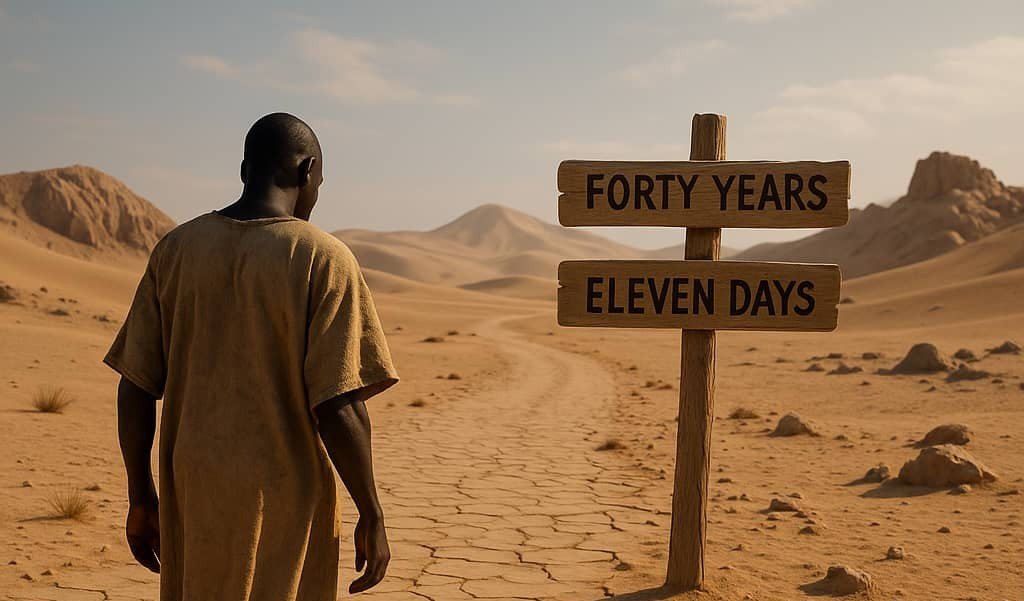By Isaac Christopher Lubogo
Introduction:
It is recorded in Deuteronomy 1:2 that the journey from Horeb (Mount Sinai) to Kadesh Barnea—on the edge of the Promised Land—takes only eleven days by the Mount Seir route. Yet in Numbers 14:33–34, we are told that Israel wandered for forty years before finally entering Canaan.
And here lies the question that refuses to be silenced:
> How does a people walk for forty years what should have taken less than a fortnight—even on foot?
Shall we not challenge this claim, not as skeptics, but as thinkers called to wrestle with truth, reason, and revelation?
I. The Geography and Mathematics of the Journey
Let us begin with the cold, calculable facts.
Distance from Egypt to Canaan: Approximately 250–300 miles (400–480 kilometers), depending on the route taken.
Average human walking speed: ~5 km/hour.
Walking time at 6 hours/day: ~13–16 days maximum.
Even a sloth, the slowest mammal on earth, moves at 0.24 km/hour. At this speed, it would take approximately 83 continuous days—less than 3 months, not 40 years.
So again we ask:
> Is it believable that an entire nation, even with children, livestock, and sacred objects, could not traverse this land within a few months or years—even in lapses?
II. Was it Physical Wandering—or Psychological and Spiritual Paralysis?
If the numbers offend logic, perhaps we must turn inward. Was the wilderness not a place, but a mirror? A space of suspended growth—a divine quarantine for a generation infected not with leprosy, but with mental slavery and spiritual treason?
> “Out of Egypt I called My people, but Egypt never left their hearts.”
They were physically out, yet spiritually imprisoned. Their feet moved, but their minds stayed behind. Thus, forty years may not be a measure of distance, but of detoxification.
III. The Crisis of Belief: A Psychological Detour
What delayed them was not terrain, but terror—specifically, fear of giants (Numbers 13:33). They saw themselves as grasshoppers, not warriors. In doing so, they traded conquest for complaint, progress for panic.
Here lies a brutal truth:
> You cannot possess a promised land with a slave’s mentality.
Thus, God in His justice and pedagogy sentenced them not to death, but to delay—that those born under Pharaoh might perish, and a new generation might rise without the memory of chains.
IV. The Theological Puzzle: Was This Just?
This raises yet another rhetorical and troubling question:
> What kind of God condemns an entire generation—millions—to perish without fulfillment, for the failure of a few spies and a frightened crowd?
Is this not collective punishment?
Or was it divine discipline—a brutal but necessary pruning of a generation unfit to carry the weight of a promise?
Some may argue this was a test. Others might whisper: Was it overkill?
V. The Divine Logic of Delay: Redefining Time
In 2 Peter 3:8, we are told:
> “With the Lord, a day is like a thousand years…”
Could it be that forty years was not about human time but divine pacing? That in every delay, God was chiseling faith, building resilience, and burning off idolatry? That perhaps, some journeys are not meant to be short—not because of geography, but because of the gravity of transformation required?
But still, the human mind remains unsettled.
> Could God not have renewed them in 40 days, not 40 years? Why punish even Moses at the end, for one mistake, with denial of entry?
VI. Intellectual Holes and Honest Wrestling
We must admit: the logistics do not add up. The justice seems heavy. The length of delay evokes suspicion.
Could the 40-year number be symbolic, a Hebraic literary tool for “a generation” or “divine completeness”?
Could the wilderness narrative be a spiritual allegory, not a topographic reality?
If the journey took that long, why is there so little archaeological evidence of millions wandering in the desert for four decades?
Or are we simply reading history with the wrong lens—expecting rationality where mystery was intended?
VII. The African Mirror: Wandering Without Direction
Uganda. Africa. Our own wilderness is not Sinai, but poverty, corruption, and intellectual inertia. We, too, have wandered—not for lack of geography, but for lack of belief, unity, and direction. We have churches without transformation, governments without justice, youth without inheritance.
Like Israel, we are out of colonial Egypt—but not yet in our promised destiny.
Conclusion: When Time Becomes Judgment
The story of Israel’s 40-year delay is not just an indictment of their failure—it is a mirror for all who confuse movement with progress, and who substitute proximity for purpose.
For the journey is not counted in kilometers, but in courage. Not measured in days, but in discipline. The true Promised Land begins not when we cross a border, but when we cross from fear into faith.
So yes, it could have taken eleven days. But the road to promise, when walked without conviction, becomes a lifetime of circles.
“They moved, but they never arrived. Because arrival is not a matter of feet, but of faith.”
Isaac Christopher Lubogo
Philosopher of Promise and Provocation
3 August 2025








